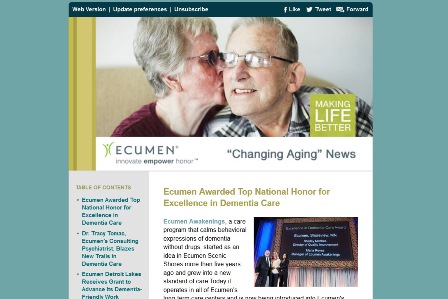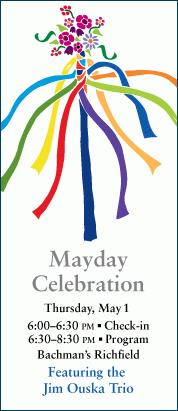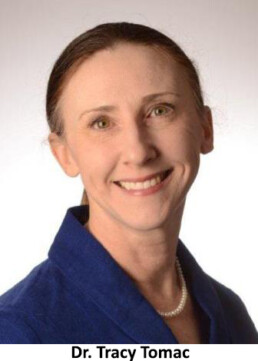Miss Minnesota 1944 Is Much Younger Than Her 90 Years
Patricia Cummings Harding, the oldest living Miss Minnesota (1944), is now 90 in chronological age. But she insists people have at least three other ages — mental, physical and spiritual — and she is less than 90 on all counts. A Star Tribune profile by Curt Brown tells her story of winning the pageant 70 years ago, then moving on to a career in Hollywood and on the radio.

Last Week's Top 5 Blog Posts- June 23
In case you missed one, here are the blog posts our online visitors found most interesting last week:
You've Got To Have Heart To Do This Job: Honoring Ecumen's Nursing Assistants
Seven Ways To Pay for Long-Term Care
Ecumen Century Club: Happy 100th Birthday Philip Dufresne
Ecumen Bethany Community To Receive Top Business Award
Ecumen Century Club: Happy 101st Birthday Ethelyde "Toni" Rasmusson
To read more Changing Aging blog posts or to learn more about Ecumen, please visit www.ecumen.org!
Changing Aging Video: Ashley, LPN at Ecumen Bethany Community
"It's a good variety. A lot of people think nursing can be the same thing every day when you work in a nursing home. But it's completely different. You have different challenges every day and you definately need to stay on the ball. It's just great - I love it!"
What it’s Like to be 100 Years Old, in 10 Charts
Interesting findings from two studies on centenarians.
Do You Stay In-the-Know With Ecumen’s Changing Aging News?
Do you receive Ecumen’s Changing Aging News? It’s a monthly email newsletter highlighting thought-provoking information true to our vision of “a world in which aging is viewed and understood in radically different ways.” And it summarizes the most significant news about Ecumen’s own work in changing aging. To sign up, go to our “Contact Us” page on the left side and opt-in to subscribe.
Additionally, there are lots of other ways to stay in touch with Ecumen and our ongoing focus on aging issues. You can read our Changing Aging Blog on ecumen.org, and you can follow us of Facebook, Twitter and LinkedIn. Plus, each of our communities has its own Facebook page.
Join us. We are changing aging.
Ecumen's Annual Report to the Community
Ecumen is honored by the generous support of private donors, corporations and foundations. Learn more about our fundraising efforts, innovative programs and those who support our changing aging efforts in Ecumen's annual Report to the Community.
Vital Aging Network Hosting Mayday Celebration
The Vital Aging Network, a nonprofit helping people 50+ live connected and vital lives, will host a Mayday Celebration May 1, 2014, to welcome spring with cool jazz, socializing and a silent auction.
The event starts at 6 p.m.at Bachman’s Heritage Room at 6010 Lyndale Avenue South in Richfield. The Jim Ouska Trio will provide music.
Tickets are $15 per person. You can register online here, or go to vital-aging-network.org for more information.
The Vital Aging Network's mission is to promote self-determination, civic engagement, and personal growth for people as they age — through education, leadership development and opportunities for connection.
A Hero at Ecumen-Managed Colonial Manor Balaton Receives National Honor
Matt Schons, who works as a cook for the food service at Ecumen-managed Colonial Manor Balaton in Balaton, Minn., ran into a burning house after a gas explosion and saved the life of a two-year-old girl in September 2012. Last week, he was awarded the Carnegie Medal of Civilian Heroism. The prestigious medal is given throughout the United States and Canada to those who risk their lives to an extraordinary degree while saving or attempting to save the lives of others. Only 22 medals were awarded this year.
The girl he saved was the daughter of a staff member at the care center and the granddaughter of Matt’s boss.
“Matt is really a great guy,” said Colonial Manor Balaton Administrator Chuck Ness. “We have a bona fide hero in our midst. This is a really big deal.”
Fox 9 News tells the story in this video:
Church as an Alternative — by Ecumen Blogger Jim Klobuchar
The usual late afternoon snowstorm had mercifully subsided. From behind the steering wheel of my car, it was theoretically possible to make out traffic signals again and approaching cars with their headlights blazing.
In one of the distant Minneapolis suburbs an unpretentious little sign by the roadside of a chapel offered the traveler an invitation:
“Try Church Again”
There was no elaboration. There really wasn’t room for it on the sign.
Smaller churches today are hurting. It’s not exactly a secret.
The church sign’s suggestion had nothing much to do with the unsocial behavior of the winter of 2014. It was an appeal for passing motorists to consider the outside possibility that a return to church might make life more sensible again; and if not that, at least a little more orderly....
I would be among the last to argue. Church today is part of my life. But you probably need to know that I have not fallen into the clutches of the Amalgamated Ministerial Societies of Minnesota and its neighbors. I’ve spent substantial years on both sides of the question of whether organized religion makes sense or is relevant. I pick no fights with those who say it is not.
But in later life, especially, I find church-- beyond its other gifts—is, well, a renewal.
As a kid I grew up in the Catholic Church. In many ways the years were endearing. I’m still ready to break out in tears when Notre Dame loses. But I fell away entering adulthood, and later felt the pain and anger, along with ,so many others in the revelations of predatory priests—although I was aware there were and are thousands of priests who serve their church and its members faithfully and unconditionally. And I joined millions in cheering the arrival of Pope Francis from Argentina.
But I’m alive today because a church pastor I’d known distantly through my newspaper work invited me to attend services with his Lutheran congregation. I’d been drinking, looking for stability in my life and wasn’t smart enough to know that it was impossible unless I realized something had to change.
It did, with the intervention of a traffic cop, a hard-headed judge, my family and a reaffirmation of belief. After awhile I felt at ease probing the mysteries in my new comfort with faith and thought I would take some of those mysteries and imagine—in a small book I wrote—how God himself might respond to the usual questions about the dilemmas of faith. I created visualization. What would I ask God if God granted a one hour interview?
It would have to be a God with whom I could converse, and probably in the English language, this being a limitation of my human condition. In this imaginary meeting, God arrived in comfortable clothing and a reasonably cordial attitude, reminding me that He heard all of those Notre Dame prayers but had to be just as fair to the folks at Southern Methodist, to say nothing of Brigham Young in Utah. Pleasantly He granted me an hour. We talked about my fallibilities, but He suggested that I was still far from being a basket case.
I found this comforting. I brought up some of the mysteries one encounters trying to square faith with the realities of today’s world. After which God said, “One problem you have when you talk about mysteries of faith is that being human you have a limited mind.” This I acknowledged. “Don’t complicate it,” He said. I said I wouldn’t in the future. He smiled pleasantly and said, “I’ll be seeing you,” a farewell I viewed with a certain shaky optimism. We left, you would hope, on good terms.
One doesn’t want to get preachy entering the mixed bogs of faith, belief, worship and the unknown. What I know about the hereafter is minimal. I know that my renewal of faith and belief needs affirmation and that a place where I can receive it is in a gathering where I can raise my voice with others in a hymn, exchange greetings and, every now and then, hear the choir sing Mozart’s “Ave Verum” — a lovely motet he wrote six months before he died, music his wife cherished. It offers a serenity, in that setting, that is altogether beautiful.
For some, it may be beautiful enough to try church again.
At 80 Gloria Steinem Continues to Change Aging
Feminist icon Gloria Steinem was never one to hide her age. Today she turns 80, and by all accounts she is more effective than ever. She has stood against ageism by the way she lives her life— openly embracing every milestone. Learn why Gloria says she loves getting old in this Fast Company story bemoaning the short-sighted ageism of Silicon Valley.



